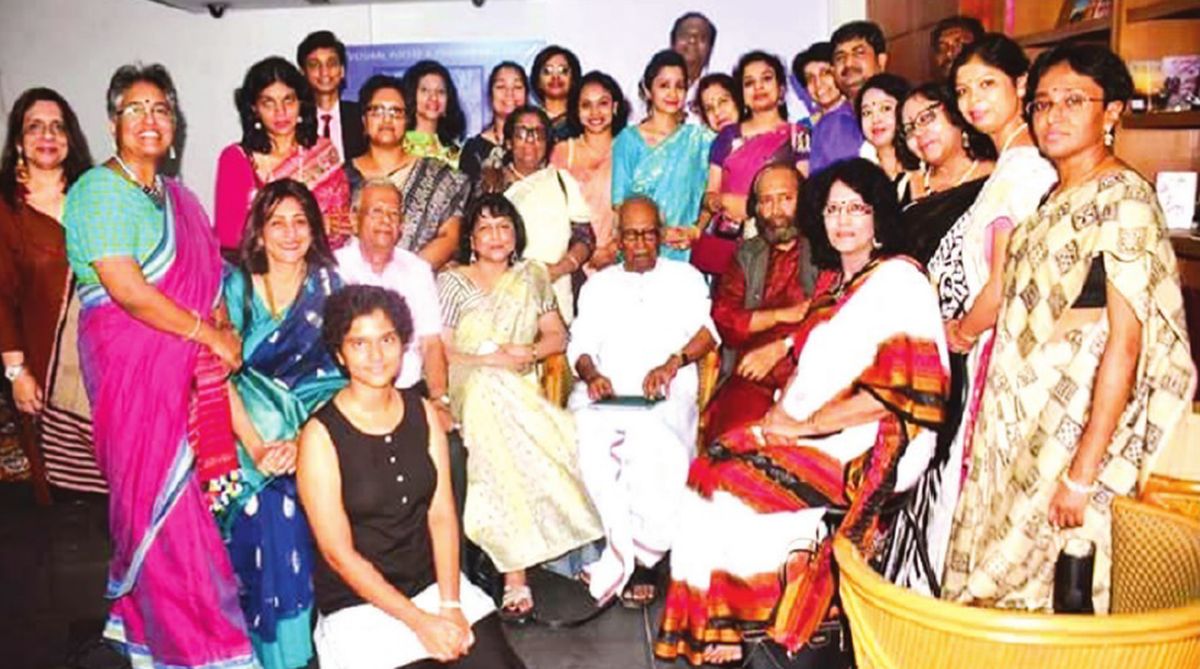Ananya Panday’s childhood poetry delights fans
Bollywood star Ananya Panday charms fans with a nostalgic childhood video reciting a cute poem on Instagram.
A poetry session organised recently by Intercultural Poetry and Performance Library at Kolkata, explored the role of poets towards their communities.

Poetry, performance and library are words that play out the harmony weaving them together. Add the prefix “intercultural” to this and what you have in front of you is an entire universe that embraces rhythm, language, romance, lyricism, music and dance, like colourful flowers strung together in a garland of symphony.
This is how this writer would like to describe this new-born entity that calls itself “Intercultural Poetry and Performance Library.” Born in April 2017 in Kolkata’s ICCR, the IPPL is comprised of intellectuals, academics, scholars, poets, actors, singers, musicians and dancers who form a microcosm of culture with a capital “C”.
This creative organisation has a youth brigade – mainly consisting of teachers of literature at different colleges and universities in West Bengal. This young brigade has been hyper active in presenting a colourful range of programmes over the year.
Advertisement
With the active cooperation of Gautam De who heads the ICCR and under the able presidentship of Sanjukta Dasgupta, the IPPL had its formal inauguration performed by none other than Jnanpeeth Awardee and poet-litterateur Sankho Ghosh who is known as the greatest living scholar on Rabindranath Tagore and his creations. If adjectives like “low-key”, “unassuming”, “grounded” and “modest” were to be used to personify any individual, every well-read Bengali will at once relate to Ghosh.
The eminent poet was welcomed by Bashabi Fraser, chief ideator of IPPL. The evening started off with lighting of the lamp followed by the release of the inaugural issue of IPPL journal, newsletter and the website of IPPL and ceremonial shelving of books in the library by Ghosh.
In her inaugural address, Dasgupta spoke at length on the history of IPPL. She added that Ghosh, the great weaver of words, was always a great source of inspiration for everyone and lauded the efforts of team IPPL, especially the youngsters, for making it happen.
She said that IPPL would be a place where everyone can read, chat face to face, engage and perform enabling students and researchers to glean knowledge on poetry and similar subjects. Fraser recalled how the evolution of the Scottish Poetry Library took place and the impact of Tagore on western readers.
De said that he was only a facilitator and exuded confidence that IPPL would definitely raise the spirit of the present day despondent Bengalis and develop a bond amongst each other through love for poetry and performing art. Pankaj Saha, former director, Doordarshan, Kolkata, lucidly elaborated on significance and relevance of IPPL.
He also reiterated that the organisation should take up active role in two-way translation work of poetry in various languages of India and yearly publication of anthology of Indian poetry and world poetry. He also added that it must set up an archive on the poet’s voices with poets reading their poems.
Can poets afford to stay aloof from their community’s fortunes? Do those who have the gift of the word not bear a responsibility towards their family, tribe, and nation in need? Would we have known about some of the Russian, Polish, Chinese or African poets if they had not been martyrs for their cause? And was not social and political commitment part of the social mores taught by the young western revolutionaries of the late 1960s? Am I, a product of Western liberal democracy, at all sincere in my appreciation of what good poetry is, or bad? These are questions raised by poet Ko Kooman in an article where the poet tries to redefine what good poetry should now mean.
But placed in perspective, there cannot be any good or bad poetry because poetry is the state of mind of a poet at that given moment when words flow our sometimes spontaneously, sometimes out of love, pain, grief, happiness, ecstasy and is differently perceived and understood by each reader. Poetry is the uninhibited and unrestrained expression of the poet’s inner self.
Over the past year, IPPL has been very active in diverse presentations and programmes. One of these was dedicated to a Tanka Poetry Workshop with poet Yusuke Tanaka from Japan. A programme called Spirit of Love was colourful with the last minute inclusion of Anne Collett and Paul Sharrad from the University of Wollongong, Australia.
Other distinguished guests included Indira Peterson from USA and Blanka Knotkova from Prague. Blanka delivered a speech on the poetry of Mallika Sengupta. Another time, Kapilkrishna Thakur, a reputed Bengali Dalit poet also read his poems. Tania Chakraverty and Antara Ghatak staged poetry and dance recital entitled The Boarders of My Heart.
A Poetic Evening, Rendezvous with Robert Masterson, an American poet and author as well as the professor from City University of New York arrived to share his experience and reflection on poetry. There was an interesting collage of programmes in celebration of William Shakespeare while another one was dedicated to Kazi Nazrul Islam.
IPPL is committed to bringing poetry to the heart of the nation and also seeks to find avenues of exchange between poetry, translations of poetry from different Indian languages and other forms of visual and performing arts so as to heighten the impact of the arts on contemporary life and society and make poetry and the arts the means of societal uplift and intercultural exchange as well.
Advertisement